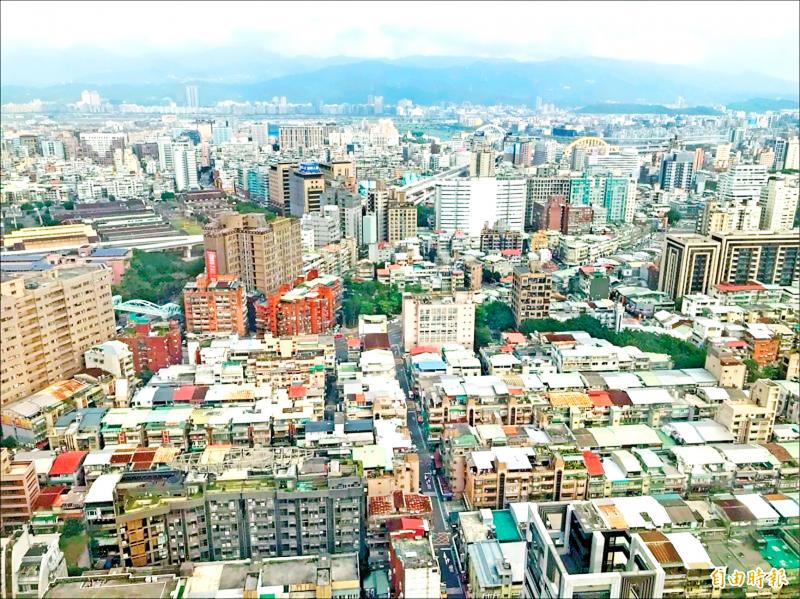The urban land price index for Taipei grew at slightly faster than elsewhere in Taiwan during the second and third quarters of last year, data released by the Ministry of the Interior on Friday showed.
The urban land price index — the weighted average land price of urban areas, which is measured every six months — rose 1.54 percent for Taipei in the April-to-September period compared with the previous six months, the data showed.
The increase reflected a relatively low comparison base in the previous six months, when initial fears over the COVID-19 pandemic hurt the city’s property market, and a stabilization of property prices later in the year, the ministry said in a statement.

Photo: Hsu Yi-ping, Taipei Times
Taipei’s Nangang District (南港) saw the biggest gains of the city’s 12 districts, with its land prices rising 1.86 percent because of improving public transportation and a growing population fueled by development in the district, the ministry said.
The urban land price index for Taiwan as a whole rose 1.04 percent in the April-to-September period compared with the previous six months, and increased 1.21 percent from a year earlier.
The urban land price index is based on the median land price for residential and commercial property and industrial zones in a city or county to show land price fluctuations. The ministry releases the index data twice a year, in January and in July.
As for the five other special municipalities, the index rose 1.3 percent in New Taipei City, 1.09 percent in Tainan, 0.77 percent in Taoyuan, 0.76 percent in Taichung and 0.5 percent in Kaohsiung, the ministry’s data showed.
New Taipei City benefited from efforts to develop the MRT rail system, and Tainan was boosted by large investments in Southern Taiwan Science Park (南部科學園區).
The index for outlying Lienchiang County fell 0.09 percent from the previous period — the only one of Taiwan’s 16 other cities and counties to show a decline in prices.

Sweeping policy changes under US Secretary of Health and Human Services Robert F. Kennedy Jr are having a chilling effect on vaccine makers as anti-vaccine rhetoric has turned into concrete changes in inoculation schedules and recommendations, investors and executives said. The administration of US President Donald Trump has in the past year upended vaccine recommendations, with the country last month ending its longstanding guidance that all children receive inoculations against flu, hepatitis A and other diseases. The unprecedented changes have led to diminished vaccine usage, hurt the investment case for some biotechs, and created a drag that would likely dent revenues and

Global semiconductor stocks advanced yesterday, as comments by Nvidia Corp chief executive officer Jensen Huang (黃仁勳) at Davos, Switzerland, helped reinforce investor enthusiasm for artificial intelligence (AI). Samsung Electronics Co gained as much as 5 percent to an all-time high, helping drive South Korea’s benchmark KOSPI above 5,000 for the first time. That came after the Philadelphia Semiconductor Index rose more than 3 percent to a fresh record on Wednesday, with a boost from Nvidia. The gains came amid broad risk-on trade after US President Donald Trump withdrew his threat of tariffs on some European nations over backing for Greenland. Huang further

CULPRITS: Factors that affected the slip included falling global crude oil prices, wait-and-see consumer attitudes due to US tariffs and a different Lunar New Year holiday schedule Taiwan’s retail sales ended a nine-year growth streak last year, slipping 0.2 percent from a year earlier as uncertainty over US tariff policies affected demand for durable goods, data released on Friday by the Ministry of Economic Affairs showed. Last year’s retail sales totaled NT$4.84 trillion (US$153.27 billion), down about NT$9.5 billion, or 0.2 percent, from 2024. Despite the decline, the figure was still the second-highest annual sales total on record. Ministry statistics department deputy head Chen Yu-fang (陳玉芳) said sales of cars, motorcycles and related products, which accounted for 17.4 percent of total retail rales last year, fell NT$68.1 billion, or

Macronix International Co (旺宏), the world’s biggest NOR flash memory supplier, yesterday said it would spend NT$22 billion (US$699.1 million) on capacity expansion this year to increase its production of mid-to-low-density memory chips as the world’s major memorychip suppliers are phasing out the market. The company said its planned capital expenditures are about 11 times higher than the NT$1.8 billion it spent on new facilities and equipment last year. A majority of this year’s outlay would be allocated to step up capacity of multi-level cell (MLC) NAND flash memory chips, which are used in embedded multimedia cards (eMMC), a managed